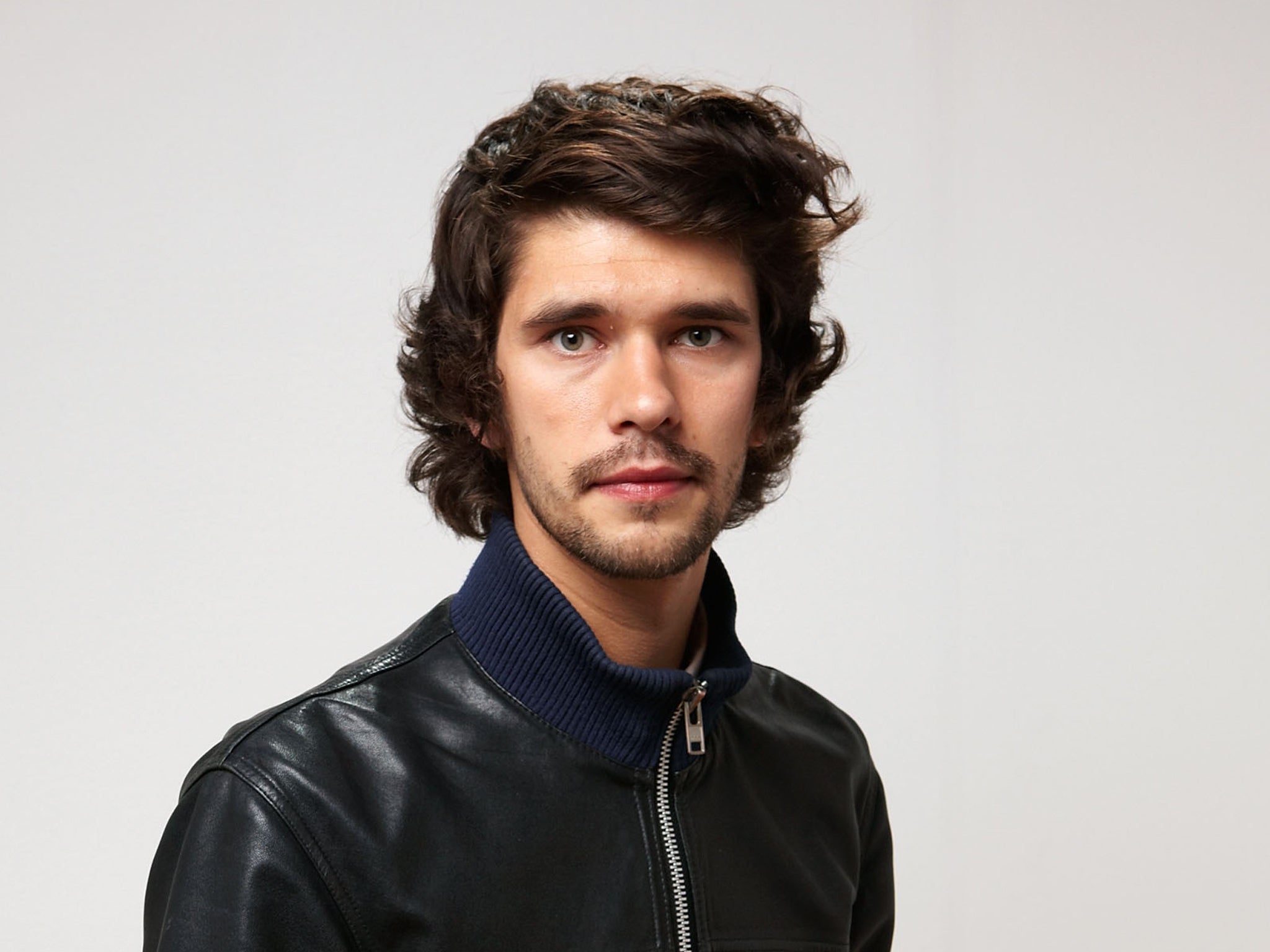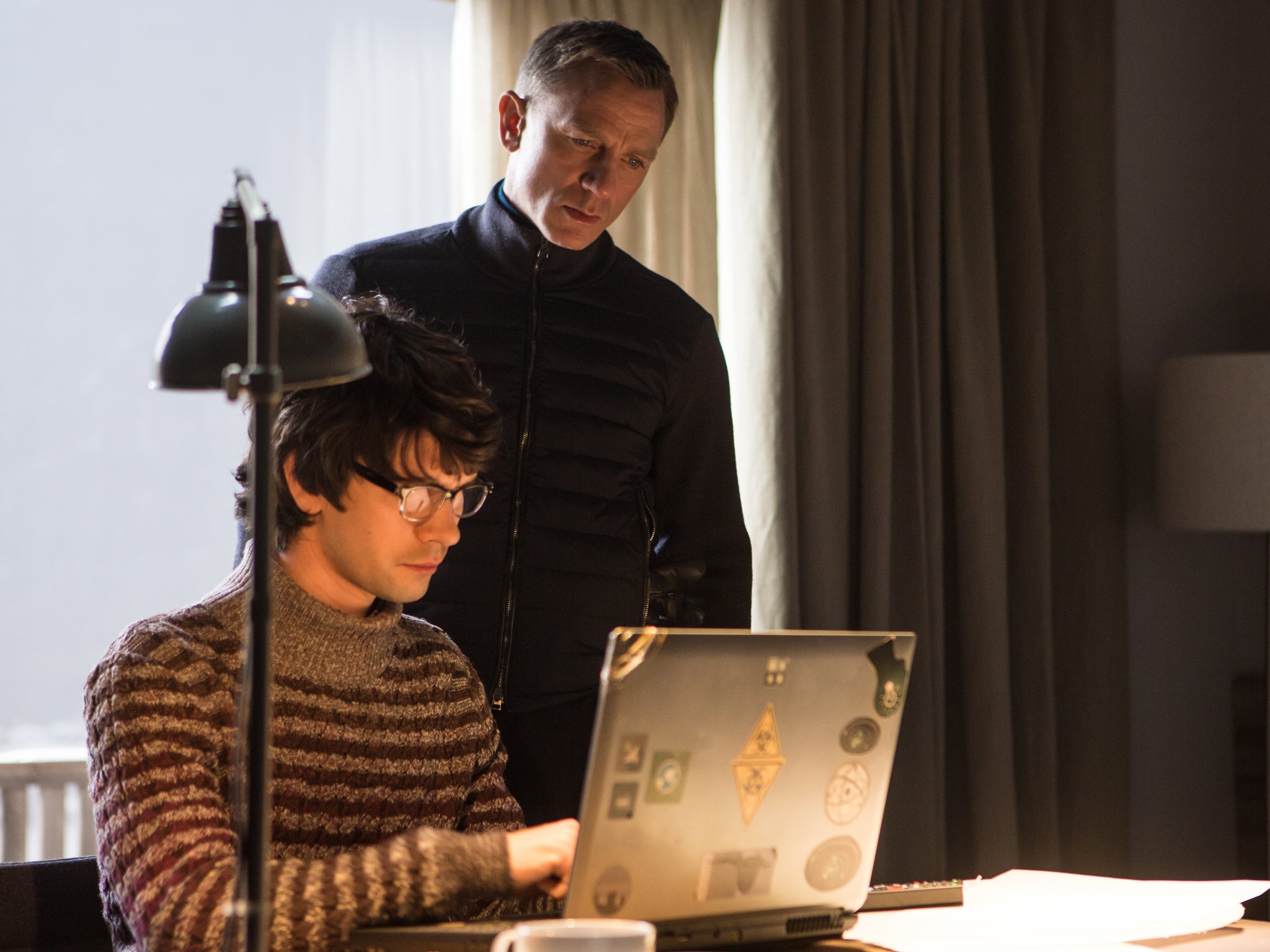Ben Whishaw interview: Spectre actors talks Q, avoiding press harassment and Freddie Mercury biopic
The private trials of Bond’s geeky sidekick

“I think I could actually make quite a good spy,” says Ben Whishaw. “I wouldn’t want to be one, but I think I possibly could.” The 35-year-old actor is certainly dressed for the part when we meet – head to toe in black – and has been getting in a lot of practice over the past year, reprising the role of Q in the latest James Bond film, Spectre, and then in the rather more darkly realistic BBC drama, London Spy, which goes out on BBC1 in November.
The first screenplay by acclaimed thriller writer Tom Rob Smith, London Spy stars Whishaw as Danny, an openly gay drifter who falls in love with the enigmatic Alex, a closeted investment banker (or so he claims). It would be wrong of me to give too much away, suffice to say that the story would seem to be inspired in part by the real-life case of Gareth Williams, the M16 agent whose corpse was found locked in a holdall in 2010.
For Whishaw, who has played so many vacillating characters over the years – from Shakespeare’s ultimate ditherer, Hamlet, to the bisexual John in Mike Bartlett’s Royal Court play Cock – Danny’s unambiguous sexuality makes a welcome change. “That’s one thing he’s very clear about and very strongly embodies and no problem,” says Whishaw, who himself came out as a gay man in 2013, after the Daily Mail started digging around in his private life.
“It was an odd thing because I wasn’t trying to hide anything but I am naturally quite private, I suppose”, says Whishaw, who, it was also revealed at the time, has been in a civil partnership with Australian composer Mark Bradshaw since 2012. “How do you make that statement to the world?” he asks. “It’s hard. Anyway, it all happened as it happened and now everybody knows and it’s not an issue really.”
It may not be an issue, but it has made Whishaw easier to interview. In the past he has seemed reticent to the point of being tongue-tied, and while even now he is not the most free-flowing interviewee – each answer weighed up with almost painful deliberation – he seems surer in his own skin. “I feel very comfortable now in myself,” he agrees. “I think people ask questions when they sense something is being concealed from them, and I don’t have anything to hide.”
While Whishaw delved into the history of M16 for his role in Spectre, he says he deliberately avoided research for London Spy. “Because Danny is not from the world that he finds himself thrust into, it was very important to that he doesn’t know he’s in a spy drama,” he says of a character that reminds him of many people he knows. “He has never found a path really, I suppose… lots of potential that’s never been realised or properly tapped into. Yeah, he’s lost in a way that’s so easy to happen in London.”
Nothing however could be more remote from Whishaw’s own experience. In 2004, six months out of Rada and a complete unknown, he found himself an acclaimed Hamlet in Trevor Nunn’s modern-dress production at the Old Vic, the same theatre where John Gielgud, Laurence Olivier, Richard Burton, Alec Guinness, Michael Redgrave, Peter O’Toole and Derek Jacobi had delivered their princes of Denmark.
“It happened very unexpectedly,” says Whishaw. “I was only 23 and mainly I just needed to survive it. I remember thinking, ‘if I start thinking about the magnitude of this, I’m going to crumble,’ so I just kept my head down.
“I don’t know what I’d think of it if I watched it now. It was interesting for people to see the character played by someone who looked like he was 18 or 19 rather than, you know… and I suppose that was effective about it.”
He is being unnecessarily modest about what was an incredibly auspicious beginning to a career that has continued both on stage and in TV and film, with the lead role in the 2006 film Perfume, as Sebastian Flyte in Julian Jarrold’s 2008 movie of Brideshead Revisited, the poet John Keats in Jane Campion’s Bright Star, and, course, stepping into Desmond Llewelyn and John Cleese’s shoes as Q in Skyfall. Did director Sam Mendes discuss why he had cast a much younger actor in the role?

“Weirdly there wasn’t a great deal of discussion,” he says. “Q is there to perform a certain function in the film that has been very well established the in the last 50 years. In a way that was more important, getting that right, understanding what people expect from Q.”
And it’s hardly Hamlet, I suggest. “It’s not, but not everything can be Hamlet and you wouldn’t want everything to be Hamlet,” he replies, adding that the glamour of being associated with the Bond franchise makes up for any artistic limitations of the role. “It’s hard not to enjoy the excitement that it generates in people. Nothing else I’ve done has generated that much anticipation. And it’s really been lovely because it’s unusual to return to work with the same group of people on a different film.”
One group of people that Whishaw expected to be hanging out with more often, but alas did not, were the cast and crew of the Abi Morgan’s BBC2 period drama The Hour, about a fictional 1950s TV current affairs programme. After two series in which Whishaw co-starred with Romola Garai, Dominic West, Julian Rhind-Tutt, Anton Lesser and Anna Chancellor – the sort of cast, in other words, that most TV commissioners would sell their own children for – as well as Emmy, Bafta and Golden Globe nominations, the BBC unexpectedly killed off the show after only two series, with the somewhat odd comment that “we loved the show but have to make hard choices”.

“I really loved that show too,” says Whishaw, who played ambitious and hot-headed reporter Freddie Lyon. “I loved that group of characters, and in hindsight it was a real shame. And I was surprised because that’s not what we were told, and not what we were expecting, so it was out of the blue, and obviously you spend however many months of your life thinking about that person, and inevitably you want to finish their story.”
The Hour’s disappointing ratings and some snippy comments by television industry veterans, who felt the show was unrealistic, weren’t matched in America – the difference neatly summarised by an LA Times writer thus: “Critics were divided… mostly by the Atlantic.”
Whishaw has since been reunited with both writer Morgan and Hour co-star Garai in the film Suffragette, in which he plays Carey Mulligan’s boorish husband. “Not boorish,” he chides. “Her slightly frightened husband, maybe, uncomprehending about what she’s doing.”
Suffragette is one of a welter of projects, current and future, on Whishaw’s slate. In the Ron Howard whaling epic In the Heart of the Sea he plays Moby Dick author Herman Melville, while in Tom Hooper’s The Danish Girl, which is about 1920s Danish artist Lili Elbe, one of the first people to undergo gender reassignment surgery (and played in the film by Eddie Redmayne), Whishaw plays a man who falls in love with Lili.
“Eddie makes a very striking… a very tall woman,” he says, reminding that Redmayne has played Viola in Twelfth Night, which has also been one of Whishaw’s ambitions, ever since seeing Harriett Walter as Julius Caesar at the Donmar Warehouse. “I’m not knocking on people’s doors begging to play her, but I was excited that gender was no longer an obstacle for playing these roles,” he says.
Whishaw is also excited about another of his current releases, The Lobster, the English-language debut of Greek director Yorgos Lanthimos – a comedy-drama set in a dystopian near-future and co-starring Rachel Weisz and Colin Farrell. “It’s one of my favourite things I’ve ever been in,” says Whishaw, who plays a character called Limping Man. “I think it’s a real work of art.”
I wouldn’t know where to start in summarising the plot of The Lobster, so I’m grateful when Whishaw has a shot at it: “It’s set in a hotel where people are sent if they are partner-less, and you must find your partner within a certain amount of time otherwise you’re turned into an animal. Yup, that’s the premise of the film.”
And that is the last that we will see of Whishaw for a while, unless you manage to get tickets for what is likely to be the hottest show on Broadway, a revival of Arthur Miller’s The Crucible, directed by Ivo van Hove, the avant garde Belgian dramaturg who won an Olivier Award in 2015 for his barefoot production of A View from the Bridge at the Young Vic. Whishaw will be co-starring with Sophie Okonedo.
Does he prefer film or stage acting, I wonder. “I just take what ever’s offered at that moment. I go with whatever I like. I like the variety. After that I’d like to another television series.”
Does he hanker for A-list Hollywood stardom? “Not really. I’ve always enjoyed being there [in Hollywood] when I’ve gone, but it’s always been for something specific and I can’t imagine just going there to… I don’t know… wait for something. I like it here and I like the work that’s happening here.”
And in any case he has a date to keep. Sam Mendes having repeatedly been refused permission to film his Bond movies inside M16’s HQ on the south bank of the Thames – in the post-modernist building dubbed “Legoland” – Whishaw himself has been invited in by the spooks. “I’ve been asked to go and present a screening of Spectre at M16 so that will the first time I have entered the building for real.”
As for the Freddie Mercury biopic, in which Whishaw was supposed to have played the late Queen frontman after the originally mooted Sacha Baron Cohen left the project citing “artistic differences”, that seems to have gone into development hell. “I don’t know. I truly don’t know. I’ve got no news about it,” says Whishaw. “There’s no script as we stand and no director and therefore no film, so we’ll see.”
Whishaw did a screen test for the part two years ago, in which he sang “Bohemian Rhapsody”. I’m impressed, I tell him. “I don’t have a great voice but I do have quite a big range apparently” – before adding with what I have come to recognise as characteristic self-deprecation, “Or so the singing teacher told me; I don’t know whether he was just trying to make me feel better.”
Spectre opens on 26 October; The Lobster is on general release, and London Spy begins on BBC1 in November
Join our commenting forum
Join thought-provoking conversations, follow other Independent readers and see their replies
Comments
Bookmark popover
Removed from bookmarks